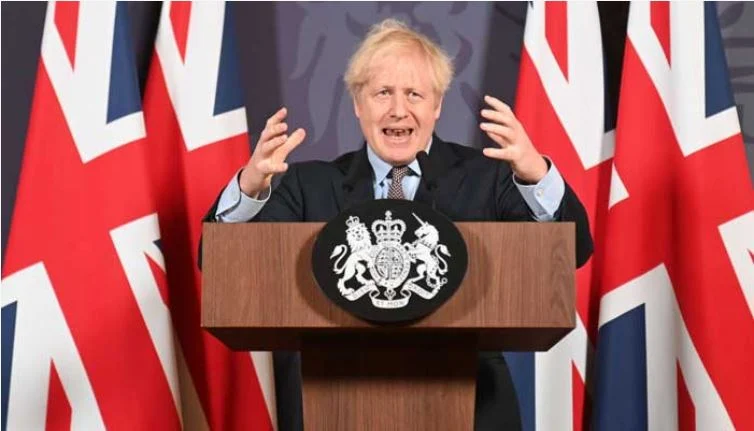BRUSSELS, DEC 24 - Britain and the European Union on Thursday finally
struck a post-Brexit trade deal that they hope will cushion the economic blow
of the UK's departure from the bloc after months of tortuous negotiations.
"The deal is done," British Prime Minister Boris Johnson tweeted, declaring that the UK would remain Europe's ally and "number one market".
"We have finally found an agreement," the
president of the European Commission Ursula von der Leyen said.
"It was a long and winding road, but we have a good
deal at the end of it," she said. "The single market will be fair and
remain so."
Britain formally left the EU in January after a deeply
divisive referendum in 2016, the first country to split from the political and
economic project that was born as the continent rebuilt in the aftermath of
World War II.
But London remains tied to the EU's rules during a
transition period that runs until midnight on December 31, when the UK will
leave the bloc's single market and customs union.
'Solid foundations'
The final 2,000-page agreement was held up by a last-minute
dispute over fishing as both sides haggled over the access EU fishermen will
get to Britain's waters after the end of the year.
Von der Leyen said that although the UK would become a
"third country" it would be a trusted partner.
"This agreement is in the United Kingdom's interest, it
will set solid foundations for a new start with a long term friend," she
said.
"And it means that we can finally put Brexit behind us
and Europe is continuing to move forward."
Johnson — who rode to power pledging to "get Brexit
done" — insisted it was a "good deal for the whole of Europe and for
our friends and partners as well".
"It will not be a bad thing in my view to have a
prosperous, dynamic and contented UK on your doorstep," he said from
Downing Street.
Leaders around the continent were quick to herald the
11th-hour accord that heads off the threat of Britain crashing out of the EU
after 47 years of shared history with no follow-on rules.
Irish premier Micheal Martin — whose EU member state would
have been hard hit by a no-deal — said the accord was the "least bad
version of Brexit possible".
"There is no such thing as a 'good Brexit' for Ireland.
But we have worked hard to minimise the negative consequences," he said.
German Chancellor Angela Merkel said she was
"confident" that the deal was a "good outcome" as it now
goes over to EU member states to agree.
For French President Emmanuel Macron — often portrayed as a
bogeyman by the British tabloids — "Europe's unity and firmness paid
off".
EU states to ratify
Following the announcement of the political accord, von der
Leyen's Commission will send the text to the remaining 27 European member
states.
They are expected to take two or three days to analyse the
agreement and decide whether to approve its provisional implementation.
The UK parliament will also have to interrupt its end of
year holidays to vote on the deal before the December 31 cut-off.
Once it is signed off and the text published in the EU's
official journal it will go into effect on January 1 when Britain has left the
bloc's single market.
The European Parliament will then have a chance to
retrospectively approve the deal in 2021, speaker David Sassoli said.
Assuming the process goes as planned, the negotiating teams
will have agreed the mammoth deal in record time.
But with Britain outside the EU single market and customs
area, cross-Channel traders will still face a battery of new regulations and
delays.
Economists expect both economies, already weakened by the
coronavirus epidemic, to take a hit as supply chains are disrupted and costs
mount.
Despite this, the threat of a return to tariffs will have
been removed, and relations between the former partners will rest on a surer
footing.
All sides will look to put a positive spin on the deal to
make it look like they gave did not give too much away.
But it will be seen as win by Johnson, as well as a success
for von der Leyen and her chief negotiator Michel Barnier, who led almost 10
months of intense talks with Britain's David Frost.
After the shock 2016 referendum, in which British voters
narrowly chose to leave the union, Brexiteers boasted that they could win the
"easiest trade deal in history".
But European capitals were concerned that if such a large
rival on their doorstep were to deregulate its industry their firms would face
unfair competition.
Brussels insisted the only way to keep the land border
between Ireland and the UK open was to keep Northern Ireland, a British
province, within its customs union.
And members balked at giving up access to Britain's rich
fishing waters, which support fleets in France, Belgium, Denmark, Ireland and
the Netherlands.
It was the question of fish that emerged as the last
stumbling block as late as this week, when member states — led by France —
rebuffed UK demands.
London pushed to reduce EU fishing fleets' share of the
estimated 650-million-euro annual haul by more than a third, with changes
phased in over three years.
The EU was insisting on 25% over at least six years.
In the end, the final agreement settled on the EU's figure
but cut the length of the transition period during which it would be phased in
to five-and-a-half years, an EU official said.
After this time access to Britain's fishing grounds will be
negotiated on an annual basis.
The spectre of yearly uncertainty had caused major concern
for European fishing communities whose political symbolism far outweighs the
sector's economic worth.
But Barnier insisted after the deal was struck that the EU "will support its fishermen and women. It will accompany them".
---------------------------------------------------------
COURTESY THE NEWS
--------------


Post a Comment